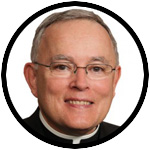
Archbishop Charles Chaput, O.F.M. Cap.
June 21 marks the start of the U.S. bishops’ annual “Fortnight for Freedom” running through Independence Day on July 4. The fortnight seeks to highlight America’s “first freedom” — religious liberty. It also seeks to encourage Catholics to work for religious freedom both here and abroad.
This year’s theme is “freedom for mission.” The reason should be obvious. Activist groups and public officials today increasingly try to force Church-related hospitals and social ministries to violate their Catholic identity. Catholic beliefs on marriage, family and the sanctity of life are targets in an on-going culture war against the biblical truths of human sexuality, nature and purpose.
The Church did not want this war and did not choose it. But she cannot in good conscience avoid it. The Obama administration’s bullying of the Little Sisters of the Poor (“Little Sisters of the Government” in a famously sardonic Wall Street Journal editorial) was only one of many recent examples.
[hotblock]
It’s a time in our nation’s history when ideas like “the Benedict Option,” i.e., withdrawing from a hostile secular culture to protect our families and faith, can seem attractive. And separating ourselves — in our thoughts, choices and behaviors — from the emptiness and noise of modern consumer life does, in fact, make a lot of sense.
The question arises: Can the piety of an authentic Christian life and patriotism for a secular state coexist in such a conflicted time?
Scripture tells us to respect and pray for our civic leaders, even when we dislike them; even when they persecute us. Jesus himself said that Caesar has a realm of legitimate authority. That realm is limited in scope, but we have a duty to obey civil authority so long as it does not demand a kind of practical idolatry. Christians were martyred not because they hated Roman power, but because they wouldn’t burn incense to the emperor’s “genius” or sacred spirit – in other words, they wouldn’t treat him as divine.
It’s true that in the first three centuries after Jesus, Early Church scholars like Tertullian, Hippolytus and Tatian all rejected military and even civil service for believers. But that changed as the empire gradually became Christian, and changed radically after the Emperor Constantine converted from paganism. From the late Fourth Century on, St. Augustine’s “just war” teaching on the legitimate use of force in situations related to self-defense came to dominate Christian thought.
Augustine also taught that Christian political engagement and public service can be morally worthy, so long as our expectations of remaking reality are modest. All human structures are flawed by sin. The City of Man can never be the City of God.
And that’s a wisdom we need to remember. Christianity is not finally about our place in this world. It’s about our place in the next. We have duty to make the material world, and especially the people around us, better for our passing. We can’t and shouldn’t try to escape from the challenges and responsibilities of the place where God plants us. We need to be a leaven for goodness, here and now. But our real citizenship, our real goal, is heaven. We belong to heaven first.
So it’s worth unpacking those two words, patriotism and piety.
The word “patriotism” comes from the Latin pater (father) and patria (homeland, native soil). As with any human father, the nation-state is not a little godling. It can never require our worship. It can never demand that we violate our religious identity and beliefs. But properly understood, patriotism is a virtue and a form of filial love. We’re sons and daughters of the land of our birth. It’s natural and deeply human to love our home and be faithful to the best qualities in our native land.
The word “piety” comes from the Latin pietas, meaning humility and a devotion to the gods. Pietas was the highest Roman virtue and a powerful force in shaping early Roman life. It’s no accident that Rome’s ancient poet Virgil, in his epic work The Aeneid, described Aeneas, the legendary founder of Rome, as pious Aeneas repeatedly.
Aeneas and his piety are pertinent for this reason. One of the great scholars of the last century, the British Catholic historian Christopher Dawson, demonstrated that all great human civilizations have started from some form of a religious founding. And as the essence of that founding is lost, illness of the soul sets in.
Humans are addicts for meaning. We’re also inescapably mortal, which means we instinctively look for purpose outside and higher than ourselves. The “God question” matters because God made us. Thus in our own country, from the very start, biblical language, belief and thought have provided our moral meaning. The more we discard these precious things, the more alien we become to ourselves and to the nation we were meant to be.
This year and every year, the most fertile witness we can offer as citizens is to speak, and to act on, and to organize our lives around, the words Jesus Christ is Lord. Defending our liberty to do that is why the “fortnight for freedom” matters.
***
Learn more about the Fortnight for Freedom here.


I watch EWTN and no problem staying close to God. This is my way of stepping out of this culture. My mind is clear and fresh. The National Catholic Register is my choice of news. I was reminded of why Our Blessed Mother chose Fatima to promote the rosary. God is good.